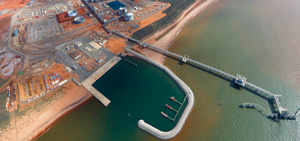Chevron and Exxonmobil to explore lower carbon opportunities in Indonesia
(Reuters) -Chevron and ExxonMobil have signed separate agreements with state energy company PT Pertamina to explore lower carbon business opportunities in Indonesia, the companies said.
Chevron signed an MoU through its subsidiary, Chevron New Ventures Pte. Ltd, and is looking at potential businesses in new geothermal technology, carbon offsets through nature-based solutions, carbon capture, utilization, and storage (CCUS), Pertamina said.
The companies would also be looking into lower carbon hydrogen development, production, storage, and transport, the statement said.
ExxonMobil and Pertamina signed a joint study agreement to assess the potential for large-scale implementation of lower emissions technologies, including carbon capture and storage and hydrogen production, the U.S. company said in a statement.
The agreements were signed during a trip by Indonesian officials to attend a summit between the United States and Southeast Asian nation leaders.
"Through our potential work in Indonesia, and the entire Asia Pacific region, we hope to provide affordable, reliable, ever-cleaner energy, and help the industries and customers who use our products advance their lower carbon goals," Jeff Gustavson, President of Chevron New Energies, said.
Indonesia aims to achieve net zero emissions by 2060 and has targeted to increase its renewable energy portfolio in its energy mix to 23% by 2025, from around 12% currently.
"This partnership is a strategic step for Pertamina and Chevron to complement each other's strengths and develop lower carbon energy projects and solutions to promote energy independence and domestic energy security," Pertamina chief executive Nicke Widyawati said.
Pertamina is currently running a trial for a binary geothermal power plant that could help the company maximize energy output from its geothermal wells as it aims to double its geothermal capacity by around 2027-2028 from 700 MW currently.
(Writing by Fransiska NangoyEditing by Ed Davies)







Comments